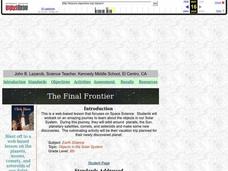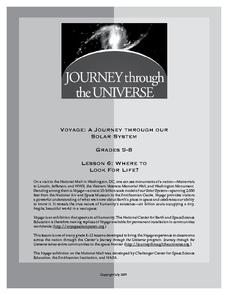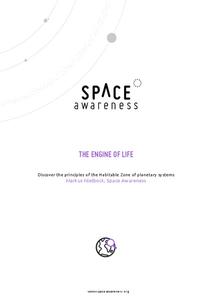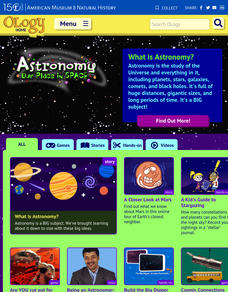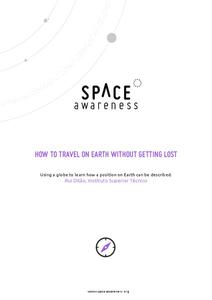Star Wars in the Classroom
Star Wars Geography Unit
What kind of animals live on an ice planet like Hoth? How would the habitat on Tatooine allow different organisms to thrive? Connect social studies, science, and Star Wars in one engaging activity that focuses on the ecosystems of the...
Curated OER
Planets in Our Solar System
Each member of a four-student group takes on a specific aspect of an assigned planet to research. After gathering information, the team works together to create a travel brochure and a presentation intended to convince other classmates...
Journey Through the Universe
Where to Look For Life?
Every year we discover new planets including more than 1,000 in 2016 alone. Will we ever find life on another planet? The lesson includes two activities to help scholars understand this concept. First, they analyze the temperature range...
Space Awareness
The Engine of Life
There is a specific zone, or distance from a star, that a planet must be in order to have water in a liquid form. The activity demonstrates how flux density depends on its distance from the source. A photovoltaic cell gets power to drive...
Space Awareness
What is a Constellation
Why do some stars in a constellation appear brighter than others? Using a get-up-and-move astronomy activity, scholars explore perspective and the appearance of constellations in the sky while developing an understanding of the...
Curated OER
Scale Activities
How do you put something as large as the universe in perspective? Use a series of scale experiments. Classmates collaborate around four experiments to examine the scale of the earth-moon system, our solar system, the Milky Way galaxy,...
Las Cumbres Observatory
The Cosmic Distance Ladder: Parallax
Scientists don't have a ruler long enough to measure to the stars, so they rely on math. Scholars learn to calculate the distance from Earth to a star using the parallax method. They use angle measures from different perspectives to...
Star Date
Modeling the Night Sky
Dramatize the stars and planets as they become a visual representation of the solar system in this activity. Young astronomers track and simulate various constellations as they orbit the Earth to learn the position and motion of objects...
American Museum of Natural History
Planetary Mysteries
A website all about planetary mysteries—it's a one-stop-shop for all things, stars, planets, and space travel. Scholars read an astronomy overview to discover the page's big ideas, then choose from the plethora of resources, including...
American Museum of Natural History
A Kid's Guide to Stargazing
Get kids interested in stargazing with a step-by-step guide. The guide begins with the do's and don'ts, what the defines a star, and introduces a journal. The page is linked to see stars if light pollution keeps stars away in your area.
media.yurisnight.net
Science Lesson Plan: Our Solar System: I Wonder?
Ever wonder why Pluto isn't considered a planet? Or how large the Earth is compared to the other inner planets? Explore the universe with a series of projects that simulate different aspects of our solar system. The activities require...
ESL Kid Stuff
Our World
There's a beautiful world all around us! Learn about the features of our planet with a series of activities designed for English learners. Kids sing, dance, and read about nature with fun lessons and interactive play.
Research Parent
Universe Cards
A 9-page packet comes with 24 cards that have pictures and informational text about each object in the universe. From nebulae to dwarf planets, objects we see—or don't see—are represented in the cards through pictures and words.
Journey Through the Universe
Is There Anyone Out There?
What is an alien's favorite game? All-star baseball! Scholars start defining living and non-living. Then, they conduct experiments to research if life exists, keeping in mind that life could be in many forms, not just human.
Center for Math and Science Education
Solar System Launch
Trying to understand the vastness of outer space can be quite a challenge for young scientists. Help put things in perspective with this cross-curricular activity as students work in pairs creating scaled models of the solar system,...
It's About Time
The History and Scale of the Solar System
Take scientists beyond our earthly reach and into the solar system. Pupils create a model of the solar system and discuss strengths and weaknesses of their model. They calculate distances in light years, discuss the nebular theory, and...
Growing Classroom
Space Travelers
Groups of three scientists from the rocky planet Zog investigate the composition of soil so that they can take the information back to their home, create soil there, and begin to grow food.
Curated OER
Solar Kit Lesson #7 - Positioning Solar Panels I: Explorations with Tracking
In this first part of a two-part lesson, learners track and record the sun's azimuth using a solar panel. They graph and analyze the data to identify relationships among the time of day, the altitude and azimuth of the sun, and the...
Mrs. Sol's Class
Solar System Project
Finish or launch your unit on the solar system with a jigsaw project covering major celestial concepts such as the Milky Way Galaxy, asteroids, meteors, comets, Earth's moon, and, of course, all the planets. Learners start by writing...
NASA
The Science of the Sun
There's more to that glowing ball of light in sky than most children realize. From the overall structure of the solar system, to the changing of the seasons, these hands-on lessons open the eyes of young scientists to the important role...
Space Awareness
How To Travel On Earth Without Getting Lost
Have you ever wanted to travel the world? Take a virtual trip with a geography lesson that uses longitude and latitude, the position of the sun, an astronomy app, and a classroom globe.
Voyage Solar System
Round and Round We Go — Exploring Orbits in the Solar System
Math and science come together in this cross-curricular astronomy lesson plan on planetary motion. Starting off with a hands-on activity that engages the class in exploring the geometry of circles and ellipses, this lesson plan then...
Core Knowledge Foundation
Astronomy—Our Solar System and Beyond Tell It Again!™ Read-Aloud Anthology
A read-aloud anthology explores our solar system and beyond. Informational texts about astronomy invite pupils to discuss readings. Extension activities examine vocabulary, sayings, and phrases. Scholars work through the writing process...
Core Knowledge Foundation
Third Grade Skills Unit 7: What’s in Our Universe?
Over four weeks, third graders participate in lessons that boost spelling, grammar, reading, and writing skills. Scholars explore spelling patterns, suffixes, singular and plural possessive nouns, quotations, and conjunctions....
Other popular searches
- Space, Stars and Planets
- The Stars and Planets
- Stars and Planets Worksheets
- Compare Stars and Planets
- Stars and Planets Puzzles
- Space Stars and Planets
- Space\, Stars and Planets
- Planets and Stars
- Comparing Planets and Stars
- Space\\, Stars and Planets
- Planets Stars



